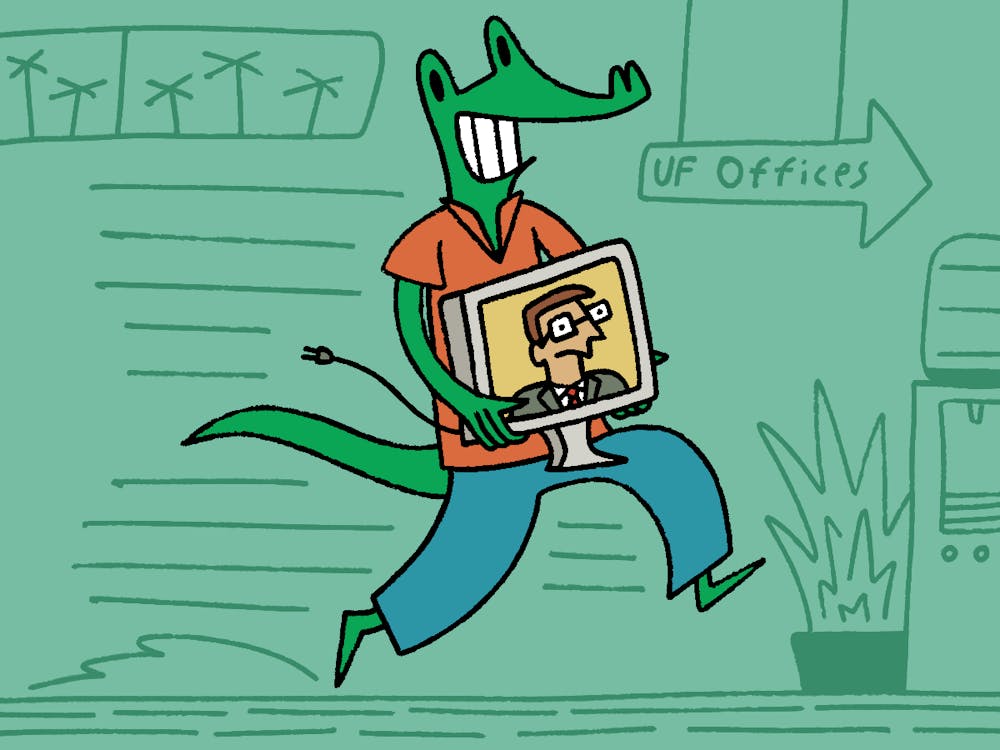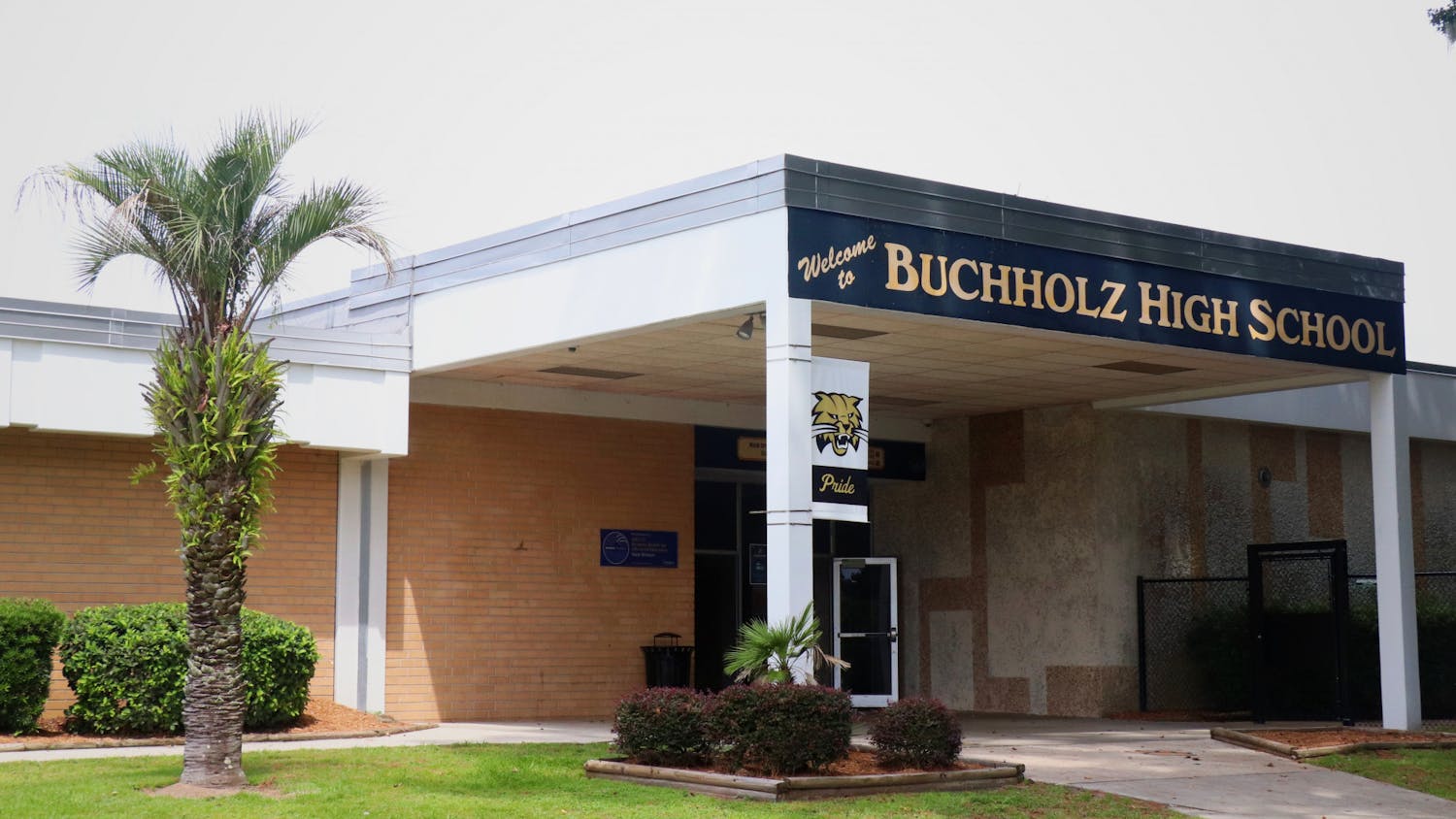Katherine McGuire works from home two days a week. The arrangement saves her an hour-long commute to work and gives her the opportunity to be productive without distractions.
When the University of Florida sent an email to employees July 24 announcing a full return to in-person work, the 40-year-old UF graduate admissions officer said the announcement was so abrupt the whole office had to stop working.
“They just pulled the carpet from under us,” McGuire said.
UF faculty and staff have a month to figure their lives out, she said.
Interim President Kent Fuchs’ email announced UF’s plans to mirror national trends in business, education and government jobs by returning to in-person work.
Florida International University announced its full return to on-campus work June 6. UF Spokesperson Steve Orlando wrote in an email that UF’s Chief Information Officer Elias Eldayrie made the decision to end hybrid work arrangements for UFIT employees around a month ago, which will take effect Aug. 11.
The decision came months after Gov. Ron DeSantis ordered an audit of state universities to identify “inefficiencies” in higher education in April. Institutions were instructed to submit a vast set of documents, including a full list of noninstructional staff positions and whether the roles were in-person, remote or hybrid.
Fuchs wrote physical workspaces promote stronger bonds by offering collaborative opportunities and encouraging creative problem-solving.
Thirty days is short notice, and it seemed like Fuchs’ email was purposeful as it aligns closely with his contract ending, McGuire said.
“I think it's just a way for them to deliver a blow that hurts a lot of us without [Fuchs] having to take the backlash because he is going to be gone,” she said.
Ending hybrid and remote work arrangements has been discussed by university leaders for the past year, Orlando wrote in an email. After consulting with the UF Board of Trustees, Fuchs decided he should make the decision instead of waiting for the next president, he wrote.
McGuire said a hybrid schedule helped with her work-life balance, accommodating her health issues so she could go to the doctor on days she worked from home. Cutting out the two-hour round trip to get to work makes a big difference in how much time she has for housework, she said.
Coming into work every day adds to transportation costs, McGuire said, and UF needs to compensate for the changes. The increased campus population will worsen pedestrian and traffic congestion, and there might not be enough room to accommodate a full staff, she added.
According to Fuchs’ email, the Chief Financial Office, Provost’s Office and the Office of Construction, Facilities and Real Estate will work closely with UF Human Resources to address space constraints. It isn’t clear how UF will do so in a month.
“I don't think they thought it through,” McGuire said.
Thomas Greenia, a 38-year-old end user computing specialist at the UF College of Education, has worked for UF for six years. He was upset to find out about the change, he said.
If there were an actual president instead of an interim one, Greenia said, he thinks things might have been different.
“[Fuchs’] contract is up, and he didn't stand up and fight for this at all,” Greenia said.
Not all faculty need to abide by the order, he added. According to Greenia, the College of Education’s dean said staff will have to return to the office, and there’s no mention of the change being applicable to faculty.
Orlando wrote in an email faculty are expected to be physically in the workplace except in cases where their assignment requires them to be elsewhere.
“We’ll be working out more details related to how this applies to specific situations as we move forward,” Orlando wrote in a text message.
UF’s decision to end hybrid and remote work agreements was “done in poor taste,” Greenia said. UF employees didn’t have a choice transitioning to remote and hybrid work during the COVID-19 pandemic, he said, but “we proved that we could rise to the challenge and still get stuff done.”
It’s not clear whether UF will compensate hybrid or remote employees as part of their compensation package, he said.
The Board of Trustees should reevaluate the potential fallout from the decision, he said.
“It's something that should have been measured before it was parceled out,” Greenia said.
Rowan Ravenswood, a 29-year-old communications coordinator for the UF Lastinger Center for Learning, has worked a hybrid schedule at UF since 2022.
To Ravenswood, working remotely had a lot of perks. Two remote days meant two fewer days to pay for a dog walker to walk her 2-year-old dog, Juniper, in the middle of the day.
Now, she has to adjust her schedule to accommodate for days she could work from home. Ending hybrid and remote work arrangements impacts everyone differently, and some people might have to make changes to child care needs, she said.
Hybrid and remote work arrangements matter to a lot of people, she said, and people might not be able to relocate or make the commute every day. Ravenswood said she’s heard UF employees consider quitting due to the change.
“What are you going to do when turnover shoots up through the roof?” she said.
She doubts the return will increase in-person collaboration, especially with jobs that remain strictly online, she said.
“It just is an inconvenience both for all of us who have to now change our lives around and for the university, which has to now expend all of the extra costs of additional electricity usage since everyone is there every single day,” Ravenswood said.
More in-person employees will put pressure on parking, which she already often has trouble finding, she said. UF staff have to pay hundreds of dollars a year for parking permits, she said, and spots aren’t guaranteed, making it tougher to find parking.
Buildings won’t be prepared to accommodate a full in-person staff, she said. One of the off-campus buildings she works at doesn’t have enough space for everyone and needs more desks and space for staff who return, she added.
Booking conference rooms will also be more challenging, she said. If teams are expected to meet in person, some buildings don’t have enough conference space to accommodate overlapping schedules, Ravenswood said.
“ It's going to be a hot mess,” she said.
Contact Maria Avlonitis at mavlonitis@alligator.org. Follow her on X @MariaAvlonitis.

Maria is the Fall 2025 university editor of the Alligator. She previously worked as the university administration reporter Summer 2025. Maria enjoys walking her dog, and on the rare occassion she has free time, she loves attempting to garden and salsa dancing.






